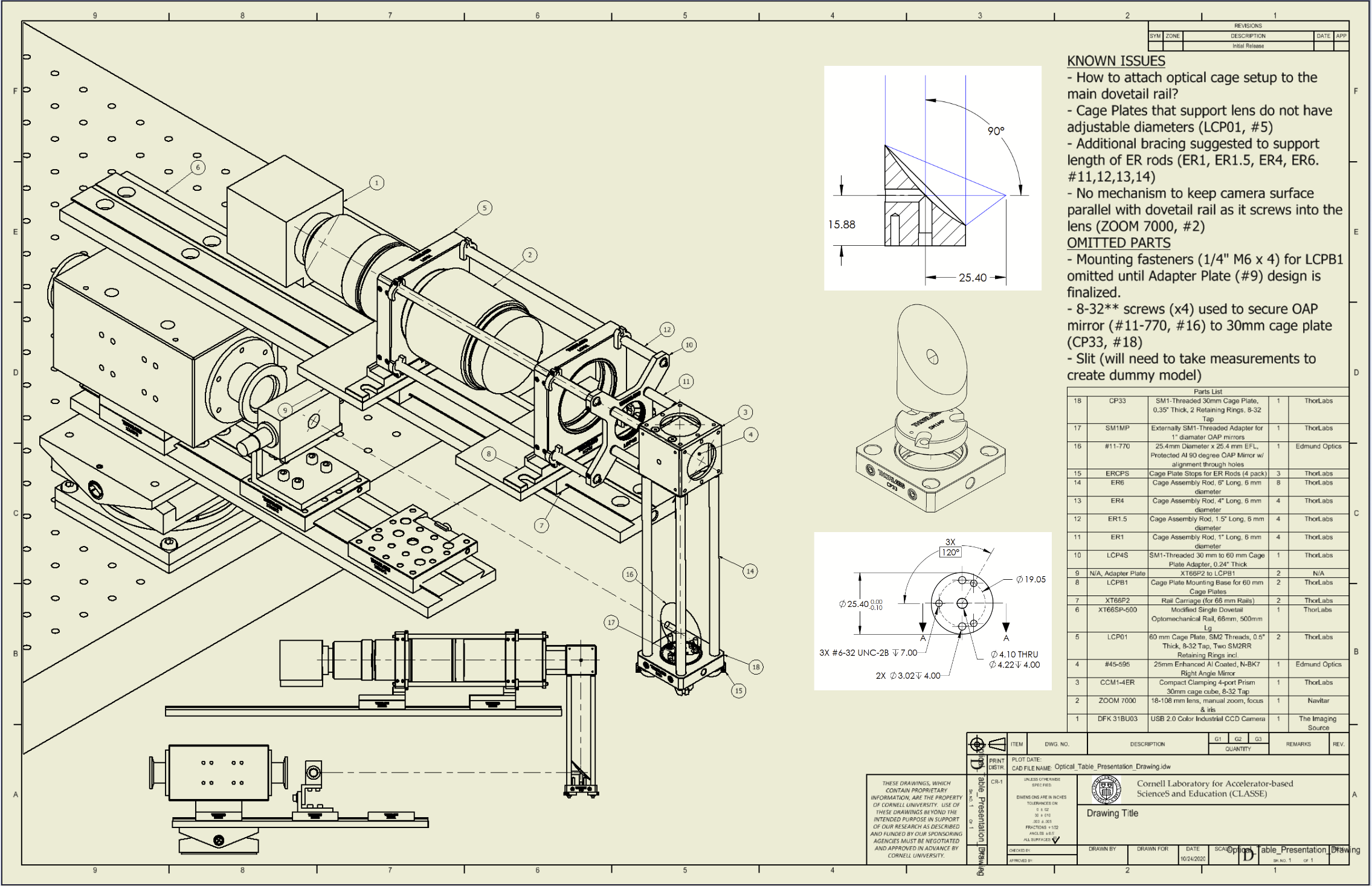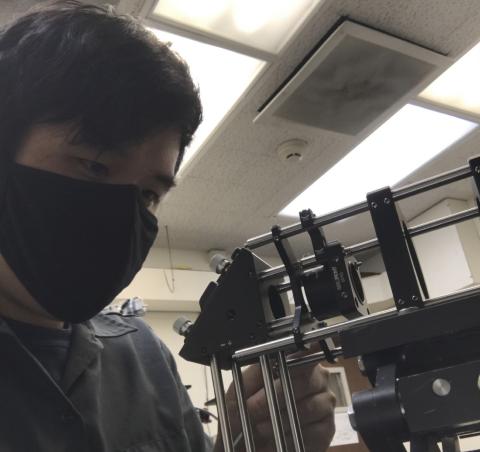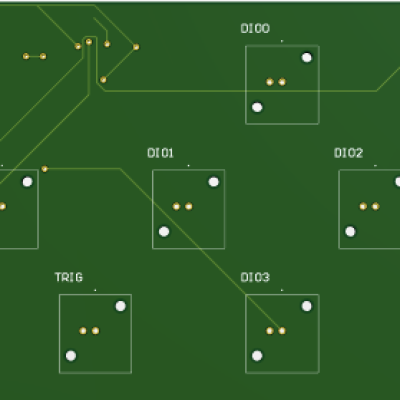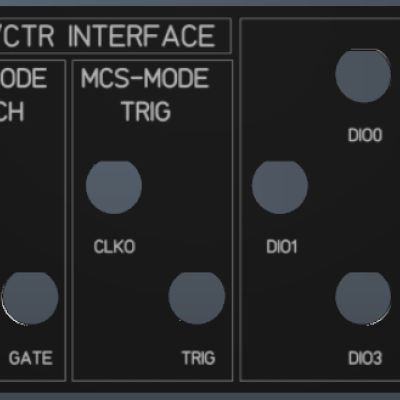The Start of Something Good
Two students from SUNY Delhi are participating in an intensive, hands-on internship at CHESS. Since their start on August 31st, Timothy Narawat and Luke Bishop, mechatronics majors at SUNY Delhi, have contributed to and led a number of projects that will have lasting impacts on the diverse technology needed for experiments at the synchrotron light source.
Mechatronics is a multidisciplinary field of engineering, incorporating controlled electronics, mechanical, and computer systems; all to adapt to the ever-evolving and intricate systems of everything in industry; from food processing and car-manufacturing, to sustainability and space exploration. CHESS requires a multidisciplinary team of engineers, technicians, programmers and scientists, and is a perfect case-study for the diverse coursework of the program offered at SUNY Delhi.
The R&D internship experience provided by CHESS is rare, and can help propel students with an advantage as they apply for jobs after graduation. In its second year, the internship program with SUNY Delhi has quickly become a highly sought-after opportunity for the incoming senior class.
Students have responded by fulfilling the needs and the culture of the lab. “Our students have both a very strong background in theory systems design and operations as well as the hands-on skill set to implement them,” says Michael F. Miller a Professor, Internship Coordinator, and Industry Liaison for the Mechatronics program at SUNY Delhi. ”What makes the mechatronics program unique is that our students are not theory-based engineers, nor are they considered technicians. They straddle the line between both realms.”
”What makes the mechatronics program unique is that our students are not theory-based engineers, nor are they considered technicians. They straddle the line between both realms.”
Whether a 20 year veteran or a college-level intern, straddling these realms is important at CHESS, where each project requires multiple skills to succeed.
Student Projects
A critical part of the internship program is that students complete at least 100 hours in four widely varying areas of work, ranging from mechanical and electronic design and assembly to inventory and purchasing. Fulfilling these requirements at CHESS naturally allows interns to interact with, learn from, and assist CHESS’s professional technical staff. That interaction was coordinated by MSN-C mechanical engineer Joe Crum, who served as their supervisor and mentor for the program.
At the start of the program in September, Tim and Luke immediately dove into preparation for remote user operations at CHESS necessitated by COVID-19. Tim helped design, assemble and deploy a mechanical arm for an alignment laser at SMB, which enabled a first-of-its kind measurement at CHESS involving strain mapping of complexly shaped, as-manufactured metal components. Similarly, Luke completed work on a custom, 3D-printable sample holder that enabled users to mail pre-mounted samples to CHESS for scan-probe SAXS/WAXS measurements at FMB. Luke’s design was immediately used for experiments by several groups during the October-November 2020 CHESS run.
Tim’s subsequent project was to design and prototype an optical system to work in conjunction with scan-probe x-ray microscopy at the FMB hutch at MSN-C. Critically, the goal is provide images of the sample as viewed along the incident x-ray beam. This so-called “in-line” view has many advantages but can be difficult to achieve due to the requirements and constraints of the x-ray measurement. Ideally, this approach would even permit infrared thermometry of a sample during in-situ processing, such as 3D printing.
Tim explains that the project aims to solve one of the difficulties faced by beamline scientists: getting the camera optics as close to the sample as possible without interfering with the X-ray beam. During his internship, Tim explored different variations of a periscope-style approach, in which the first mirror is placed immediately upstream of the sample and includes a hole for the x-rays to pass through. A particularly interesting approach Tim explored was to use parabolic rather than flat mirrors, potentially allowing the camera to be placed further away from the setup while preserving magnification.

Through this project and close work with CHESS staff it is clear that Tim has become a part of the team, showcased by how he feels about the legacy of his project. “Though it is still a work in progress, I hope to get a usable image from the in-line optics set-up before I leave,” says Tim, “so that it may be of use, not only in our lab, but others in need of a similar set up.”
...so that it may be of use, not only in our lab, but others in need of a similar set up.”
Like Tim, after his first project involving prep for remote operation, Luke spent most the 2nd half of his internship on a more complex challenge within the lab. In Luke’s case, the project was to design a highly customized electronic interface to a device employed in so-called “fly scanning” at CHESS beamlines. Fly-scanning allows 100-1000x gains in data acquisition speed for some experiments, but can be challenging to implement in a flexible and robust fashion. Luke’s project involved creating a custom interface panel with a couple dozen coaxial cable connectors and LEDs, as well as a custom circuit board to perform traffic control between that panel and a USB counter/timer device. The project required learning several new pieces of software and heavy interaction with the CHESS electronics group. Once complete, this box will be used immediately at FMB, with additional applications to at least two other CHESS beamlines.
Luke says he is happily surprised with how well his projects are going. “You come into Cornell and hear great things about how smart everyone is, I half expected to flop on my face,” he says with a big grin over Zoom. “But everyone has been super helpful, and willing to share their expertise and knowledge, especially Joe.”
Everyone has been super helpful, and willing to share their expertise and knowledge, especially Joe.”
Joe Crum a Research Support Specialist with MSNC-C, is Tim and Luke’s mentor, and says that the SUNY Delhi students made his job quite easy. “Any direction that I would give them, both Tim and Luke soaked it like a sponge and did their own research to make it work. They were ready to go when they got here, and they have made it so easy,” says Joe. “They both came in here with never using Inventor before, and now they are already doing designs that are ready for the shop,””
Both of the students describe communication as being critical to their projects’ success. By collaborating closely with CHESS scientists and engineers like Joe, they are able to gather information about the function of their particular apparatus, while the technicians at CHESS are eager to help with their fabrication. The students are then expected to deal with the final outside vendors, who are needed to procure parts for the build.
Looking to the Future
Students of mechatronics are highly sought after by manufacturing industry, pharmaceutical companies, food and beverage processing, distribution centers, and power generation industries.
However, for some students, the research field becomes their calling.
Last year’s SUNY Delhi intern, Timothy Joyce (TJ), is now a research associate at CHESS, taking the position after graduating from the mechatronics program. TJ explains that the skills needed for the degree are closely related to the internship. “The most valuable skill I developed [with the mechatronics program] is the ability to assess problems and approach them strategically and methodically, using what facts and theories you do know to help determine the missing pieces,” says TJ. “ Due to the sheer size, complexity and diversity of systems and projects here at CHESS this skill has been invaluable.”
“Our graduates have been described as the industry's "blue-collar engineers". They have both a very strong background in theory systems design and operations as well as the hands-on skill set to implement them,” says Mike Miller. “The ability of our students to secure these outstanding CHESS internships attest to the strength and uniqueness of the SUNY Delhi mechatronics program and the opportunities that await our graduates.”
Funding for the internship is provided by MSN-C, the Materials Solutions Network at CHESS.




